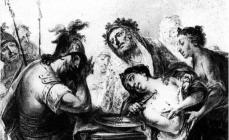With a light hand of Karamzin, Prince Svyatoslav is considered to be ancient Russian Alexander Macedonian. Information about the battles spent and won the limitations of the years are not considered in detail, but one thing is clear: to their thirty years, Svyatoslav managed to organize with a dozen military campaigns, and in most won.
Battle with Treaks
For the first time, Great Prince Svyatoslav Igorevich participated in the battle in May 946, however, he headed the army only formally, since it was all four years from family. When his warriors lined up on the battlefield against the Drevlyan, the governor Sveneldd and Asmud brought the horse on which the juvenile Svyatoslav was sitting, gave a boy to a spear, and he threw him towards enemies. "The prince has already begun, dying, squad, for the prince!" - shouted the commander, and the invisible Kiev army went forward. Trees were broken, locked in cities. Three months later, thanks to the tricks of the princes of Olga, the estimate was taken, and the first of the military campaigns of Svyatoslav ended the victory.
Battle under Sarkul
965 year. The first independent campaign of Svyatoslav. After passing the land of Vyatichi, the only one of the East Slavic tribes, which did not pay Dani Kiev, descending along the Volga to the lands of the Khazar Kaganata, Svyatoslav defeated the long-standing enemy Rusi. One of the decisive battles took place under Sarkel, the forpan of Khazaria in the West.
Two armies came together on the banks of Don, Svyatoslav defeated the Khazar army and pushed into the city. Siege lasted long. When Sarkel fell, his defenders were mercilessly beaten, the inhabitants ran away, and the city itself was burned to the ground. In his place, Svyatoslav laid the Russian outpost of the White Taja.
Second taking of Presbywa
Visantia influxed, the Grand Duke invaded Bulgaria, took it the capital of Preslav and began to consider it a middle (capital) of his land. But the raid of Pechenegs to Kiev made him leave conquered lands.
When Svyatoslav returned, it discovered that the provincial opposition in the capital took the top, and the whole city rebelled against the prince. He had to take Preslav for the second time.
The 20,000 Russian troops opposed superior enemy forces. And the battle under the walls of the city first developed in favor of Bulgaria. But: "Brothers and squad! I will die, but I will die with hardness and courage! " - Prince turned to the warriors, and the decisive attack was crowned with success: the battle move was reversible, Svyatoslav occupied Preslav and severely dealt with traitors.
Siege Filippopol
By the main rival of Russia was Byzantia, it was in Constantinople that Svyatoslav was outlined his main blow. To achieve the borders of Byzantium, it was necessary to pass the southern Bulgaria, where the anti-Russian moods were strongly powered by the Greeks. Rare cities surrendered without a fight, and in many Svyatoslav was forced to arrange indicative executions. One of the oldest cities in Europe, Philippol, especially persistently resisted. Here, on the side of the rebels against the Russian prince, Bulgarians fought and the Byzantines, whose main army was a few tens of kilometers to the south. But the army of Svyatoslav was already coalition: Bulgarians, Hungars, Pechenegs appeared in the Union with him. After the bloody battle, the city fell. His garrison, governors, prisoners of the Greeks and unreasonable to Russian Bulgarians were executed. 20 thousand people on the orders of Svyatoslav were planted on the count.
Two general battles in Byzantium
Further promotion of Byzantium, Svyatoslav led by two armies: one, which consisted of the best Russian warriors, seasoned in the battles of the warriors, he led himself, the other - Russa, Bulgarians, Hungarians and Pechenegi - was under the beginning of Kiev governors of Sfenkela.
Coalition army collided with the main army of the Greeks near Arkadiopole, where the general battle took place. Having calculated that the weak link in the army of the Allies are Pechenegi, the Byzantine commander of Varda Skilir sent the bulk of the troops to their flank. Pechenegs drown and ran. The outcome of the battle was predetermined. Russa, Hungarians and Bulgarians fought hard, but were surrounded and defeated.
The battle of Svyatoslavov troops was no less severe. The 10-thousand squad of the prince opposed the squad under the command of Patricia Peter. As before, Svyatoslav managed to turn the battle of the battle into a critical moment for himself: "We have nowhere to go, we want or do not want to fight. So it's not for the land of Russian lands, but I will lie to the bones here, for the dead will not have. If we run - we will be a shame. " He rushed forward, and followed by the army. The Greeks fled from the battlefield, and Svyatoslav continued a victorious procession to Constantinople. But, having learned about the defeat of the second army, was forced to go on a truce with the Byzantine emperor: there was no strength to the siege of the allies.
Dorostola protection
Violating the peace treaty, the Greeks in 971 attacked first to the Preslav, then, ruining the cities, headed for the Danube, to the city of Dorostol, in which Svyatoslav was located. His position turned out to be more than severe. The bloody battle under the walls of the city lasted in the morning to the very floor and forced Russess with Bulgarians to retreat for the fortress walls. A long siege began. From Sushi, the city surrounded the army under the command of the emperor, Danube blocked the Greek fleet. Russa, despite the danger, committed bold bars. In one of them, a senior official Master John was beheaded. Other warriors were made at night in the strongest rain: the boats went around the enemy fleet, collected grain reserves in the villages and beat many sleeping Greeks.
When the position of his army became critical, Svyatoslav considered shame to surrender or run away and brought the army for the walls of the city, ordered the gate to locate. Two days with a break for the night of his warriors fought with Byzantines. Having lost 15 thousand people, the Grand Duke returned to Dorostol and agreed to the world proposed by Emperor Tsimischius.
Monument to Prince Svyatoslav Igorevich in Zaporizhia
Lately, leaving the Kyiv Principality in the care of Olga, Svyatoslav made his first brilliant hiking. He went to Oka and subjugated by Vyatichi, who then paid tribute to Khazaras; Then he appealed to the Khazar and defeated the Khazar kingdom, taking the main cities of Khazar (Sarkel and ITIL). At the same time, Svyatoslav defeated the tribes of Jases and Kasov (Circassians) on the river. Kuban and mastered the terrain in the mouths of Kuban and on the Azov coast called Tamarha (later Tmutarakan). Finally, Svyatoslav penetrated the Volga, ruined the land of the Kamsky Bulgarians and took their city Bulgarian. In short, Svyatoslav won and ruined all the eastern neighbors of Russia, which was part of the Khazar Power system. The main force in the Black Sea was now rus. But the fall of the Khazar state strengthened nomadic cookies. Now all the South Russian Steppes occupied by the Khazars now came to their disposal; And Russia itself soon had to experience big troubles from these nomads.
Returning to Kiev after its conquests in the East, Svyatoslav Igorevich received an invitation from the Greeks to help Byzantium in its fight against Danube Bulgarians. Having gathered a big rhe, he won Bulgaria and stayed there to live in the city of Pereyaslavtsu on the Danube, as he considered Bulgaria with his property. "I want to live in Pereyaslav Danube," he said: "There are the middle of the center (center) of my land, there are all the goods: from the Greeks of gold, fabric, wine and fruits, from Czechs and Things - silver and horses, from rus fur, wax and honey and slaves. " But he had to return from Bulgaria to Kiev for a while, because Pechenegs attacked Russia in Russia and besieged Kiev. Kievans with the princess Olga and the children of Svyatoslav barely served from the Terrible enemy and sent to Svyatoslav with reproes and a request for help. Svyatoslav came and drove Pechenegs in the steppe, but in Kiev did not remain. Olga, Olga asked him to wait for Rus to her death. He fulfilled her desire, but, buried his mother, now he went to Bulgaria, leaving the princes of his sons by princes. However, the Greeks did not want to allow Russian domination over Bulgarians and demanded the removal of Svyatoslav back to Russia. Svyatoslav refused to leave the shores of the Danube. The war began, and the Byzantine emperor John Tsimischi defeated Svyatoslav. After a series of hard effort, he locked Russians in the Dorostol fortress (now a Silleriary) and forced the Svyatoslav to conclude the world and clean up Bulgaria.

The meeting of Prince Svyatoslav with the emperor John Zimischius on the shore of the Danube. Picture K. Lebedev, OK. 1880.
Svyatoslav's army, incentive war, on the way home was captured in the Dnipro thresholds of the Pechenegs and scattered, and Svyatoslav himself was killed (972). So Pechenegs tried the defeat of the Russian prince, started with the Greeks.
After the death of Svyatoslav Igorevich in Russia between his sons (Yaropolk, Oleg and Vladimir), there were civil councils in which Yaropolk and Oleg died, and Vladimir remained unique. The state was shocked by gravestics, the state was signs of internal decomposition, and Vladimir had to spend a lot of strength to discipline Varyagov, he served in him, and pacify the deposited tribes (nasty, radios). Stepped after the failure of Svyatoslav and the external power of Russia. Vladimir led many wars with different neighbors for border volosts, fought also with Kamaski Bulgarians. He pulled into a war with the Greeks, as a result of which Christianity accepted the Greek rite. This most important event ended with the first period of power of the Varana dynasty in Russia.
So the Kiev principality was formed and fastened, which united the politically most of the tribes of the Russian Slavs.
Russian Prince Svyatoslav conducted the bulk of his life in combat camsions. His first hike took place when the prince was only four years old. It was the campaign of Olga to the Drevlyan, who brutally killed her husband -. According to the tradition, he could only be the prince, and it was the hand of the young Svyatoslav threw a spear, giving the first order a squad.
Svyatoslav practically did not interest state affairs and internal politics, the decision of these issues the prince fully granted his wise mother. IN brief biography Prince Svyatoslav Igorevich should mention that the passion and meaning of his life was war. The squad of Svyatoslav moved unusually quickly, because the prince that does not recognize in the hikes of luxury, did not take tents and weapons with him, which would slow down the movement. He enjoyed considerable respect among the warriors, as they shared their life. Svyatoslav never attacked unexpectedly. Warning the enemy about the attack, the prince won in an honest battle.
In 964, the hop of Svyatoslav in Khazaria began. His way was lying through the land of the Khazar Danikov - Vyatichi. Svyatoslav made them pay the tribute to himself and only after that moved further to the Volga. Low on the banks of the river Bulgarians had to be not easy. Svyatoslav's campaign to Volzhskaya Bulgaria (Bulgaria) led to the plunder of many villages and cities. A full defendant Knince Svyatoslav Khazar took place in 965. The Russian prince ruined the Khazar lands and seized their main city - White Visey. Having ended with victories over the inhabitants of Finments, the tribes of casmen and yases.
However, rest OT rattie works In Kiev was not long. The Embassy of the Emperor Nikifora 2nd Foki, who arrived soon for the prince, asked him to support against the Bulgarian living in the Dongy lands. This trip was also victorious. Kyiv Prince Svyatoslav so liked the Bulgarian lands, adjacent to Byzantia, that he wanted to transfer his capital from Kiev to Pereyaslavl.
The territory of Svyatoslav defeated by Svyatoslav, which closed the path to nomads from Asia, was now flooded with Pechenegs, bribed by the emperor of Byzantium. Nomads in 968 surrounded Kiev in the absence of Prince. Olga called for the aid of the Voivot Petich. retreated, perhaps, deciding that the militant prince is returned. The Svyatoslav appeared much later was driving them away from the borders of Kievan Rus.
In 969, the princess Olga died, and Christians who had lost her patronage were persecuted. In the same year, leaving sons, Oleg and, edit, Svyatoslav went to the second campaign on Bulgarians. By that time, Nikifor 2nd Fock was killed, and the throne occupied John Tsimischius.
Svyatoslav Victory Winned in Bulgaria was unprofitable by Byzantium. Tsimischius, not wanting to strengthen the Svyatoslav in Bulgarian lands, sent ambassadors to the prince with rich gifts and the requirement to leave the conquered territories. The response of Svyatoslav was the proposal to redeem the captured Bulgarian cities. The exhaust war of the Greeks began. Cimiri's warriors after severe struggle traveled by Pereyaslavtz. The battles moved to Dorostol, where the Greeks were able to surround the prince and a squad. Siege lasted for three months. Svyatoslav and his warriors suffered hunger and suffered from diseases. As a result, an agreement was concluded, according to which the prince pledged to leave Bulgaria, to issue all the prisoners of the Greeks and prevent the attack on the territory of Byzantia of other tribes.
While the prince led the fight against the Greeks, Pechenegs came to the Kiev lands again and almost captured a capital degrees. According to historians, the emperor of Byzantium told the Pechenezhsky leader Kura that the Kiev Prince returns with a small friend. Svyatoslav and his warriors died in a fight with the attacks on them. So the Board of Svyatoslav Igorevich was completed, after which Yaropolk ascended to the Kiev throne. The legend says that from the skull of Svyatoslav smoking made a bowl decorated with gold and stones.
In 945, after the death of Father, Svyatoslav at an early age remains with the mother of Olga and the approximate educators asmud and Svendeld.
Svyatoslav grew among the warriors. Olga, having decided to take revenge for her husband's death, took a child with him and putting it on his horse, handed a spear. He began the battle, symbolically casting a spear, which flew through the horses ears and fell to his legs. "The prince has already started the fight, follow, squad, behind him!" Svyatoslav's act inspired by the warriors and Rusa won the battle.
Hiking Svyatoslav
Since 964, Svyatoslav Rules independently. In 965, leaving the princess Olga to manage Kiev, went hiking. The whole further part of the life of Svyatoslav conducted in the campaigns and battles, only sometimes visiting the native edges and the mother, mainly in critical situations.
During 965-966. Subdued by Vodnichi, freed them from Dani Khazaras, defeating Khazar Kaganat and Volzhsky Bulgarians. This gave the opportunity to take control of the great Volzhsky way, which connects Rus, Central Asia And Scandinavia.
In his battles, Svyatoslav became famous for the fact that before attacking the enemy, sent a messenger with the words: "I go to you!" Capturing the initiative in conflicts, he led an armed offensive and succeeded. "The Tale of Bygone Years" describes Svyatoslav "He moved and walked, as a paard (that is, a cheetah), and fought a lot. In the same time he did not have any ages nor the boilers, did not boil meat, but, finely cutting the horse, or the beef, or beef, and, roasted on coals, and eating. He did not have a tent, but slept, the Podlock with a saddle in his heads. The same were all other warriors. "
The opinions of historians in the description of Svyatoslav coincide. Byzantine  chronist Lion Deacon talks about Svyatoslav: "Average growth and very construction, had a wide chest, a flat nose, blue eyes and long weapons. The hair on his head was eclipsed, with the exception of one curl - a sign of noble origin; In one ear hung a gold earring decorated with ruby \u200b\u200band two pearls. The entire lookoff of the prince represented something gloomy and severe. White clothes It was different from other Russians only. " Such a description confirms the volitional character of Svyatoslav and the insane crave for the seizure of foreign land.
chronist Lion Deacon talks about Svyatoslav: "Average growth and very construction, had a wide chest, a flat nose, blue eyes and long weapons. The hair on his head was eclipsed, with the exception of one curl - a sign of noble origin; In one ear hung a gold earring decorated with ruby \u200b\u200band two pearls. The entire lookoff of the prince represented something gloomy and severe. White clothes It was different from other Russians only. " Such a description confirms the volitional character of Svyatoslav and the insane crave for the seizure of foreign land.
Svyatoslav was considered a pagan. Princess Olga, adopting baptism, tried to persuade his son, too, to adopt Christianity. According to the chronicles, Svyatoslav refused and answered Mother: "How can I take another faith? My squad will be mocking. "
In 967, Svyatoslav with his buddy defeated the army of Bulgarian  tsar Peter. Moving to the mouth of the Danube "Put the city of Pereyaslavl (Small Pereslav). The city liked Svyatoslav so much that he decided to make it the capital of Russia. According to the chronicles, he said Mother: "It's not anyone to sit in Kiev, I want to live in Pereyaslavtsa on the Danube - there is the middle of the earth of mine! Everything is good there: from Greece gold, tops, wines and various fruits, from the Czech Republic and Hungary silver and horses, from Russia's rus and wax, honey and fish. " And even there is evidence that he reigned in Pereyaslavs and here received the first tribute to the Greeks.
tsar Peter. Moving to the mouth of the Danube "Put the city of Pereyaslavl (Small Pereslav). The city liked Svyatoslav so much that he decided to make it the capital of Russia. According to the chronicles, he said Mother: "It's not anyone to sit in Kiev, I want to live in Pereyaslavtsa on the Danube - there is the middle of the earth of mine! Everything is good there: from Greece gold, tops, wines and various fruits, from the Czech Republic and Hungary silver and horses, from Russia's rus and wax, honey and fish. " And even there is evidence that he reigned in Pereyaslavs and here received the first tribute to the Greeks.
Byzantine Emperor John I Tsimischiy, being in collusion with the Pechenegs, was very concerned about the success war hikes Svyatoslav And tried to weaken the neighbors. In 968, learning about the approval of Svyatoslav in Bulgaria, John forced Pechenegs to attack Kiev. Prince left Bulgaria and returned to Kiev, to defend his city, where his mother's rules. Svyatoslav defeated Pechenegs, but the treachery of Byzantium did not forget.
Children of Svyatoslav
Svyatoslav had three sons: the first Yaropolk was born from the first wife, daughter or sister of the Hungarian king. According to other data of Kiev, Boyarin Dance. Second Vladimir. Considered illegitimate. Nick red sun. Mother Malushi or Malfred, Daughter of the Treated Prince Mala. The third son of Oleg from the wife of Esphyri.
After the death of the mother, in 968, Svyatoslav transmits the internal affairs of his state to grieving sons. Yaropolki Kiev. Vladimir Novgorod. Oleg received the Treesheskaya lands (in this moment Chernobyl district).
Bulgarian campaign of Prince Svyatoslav
In 970, Svyatoslav decided to conclude an agreement with Bulgarians and with the Hungarians against Byzantium. Collecting the army about 60 thousand, he began a new military campaign to Bulgaria. According to chroniclers, Svyatoslav brought the Bulgarians to their actions and thus obeyed them. She took Filippopol, passed the Balkans, captured Macedonia, Frace and got to Constantinople. According to the legend, the prince turned to his squad: "It's not for the land of Russian, but I will lie to the bones here, for it is not ashamed of the dead. If we run - we will be a shame. "
After fierce fighting and large loss In 971, Svyatoslav took still the strengthening of the Byzantines and was forced to sign a peace treaty with the emperor John Zimischius. Returning to Kiev, Svyatoslav was packered and killed at the Dnieper thresholds. From his skull was made of gold mine, a bowl for peters was made.

After RATA hikes Svyatoslav Igorevich (965-972) the territory of the land of Russian increased from the Volga region to the Caspian Sea, from North Caucasus To the Black Sea, from the Balkan Mountains to Byzantium. Won Khazaria and Volzhskaya Bulgaria, weakened and frightened the Byzantine Empire, opened the way to trade Rus with the eastern countries.
Svyatoslav Brave is known from the chronicles as the ruler of Russia in 945-972. He distinguished himself as a bold commander. Svyatoslav Biography full interesting factsthat we consider.
Origin
The Old Russian chronicles tell that Svyatoslav brave is the son of Princess Olga and Prince Igor. There is no accurate information about the date of his birth. In some sources, 942 years old are specified, in others - 920.
In history Ancient Russia Svyatoslav brave is considered the first leader having a Slavic name. His progenitors have a Scandinavian origin.
In some sources, the name of the prince is referred to as Sfendoslavos. Experts suggest that the Scandinavian name is Sven merged with the Slavic ending -Clav. But not all scientists agree with a similar interpretation, because many Slavic names have a prefix with a candle, which, after losing sounds, gives the Slavic syllable "holy", which means "saint".
Childhood
In historical chronicles, the first mention of Svyatoslav is available in 944. This is the contract of Prince Igor with Byzantia. According to the chronicle documents, Prince Igor was killed in 945 for collecting a huge Dani. Olga, having a young child, spoke out against the razlyan.
The campaign was successful, and Olga, having won, conquered Drevlyan and began to rule them.
The chronicles inform that Svyatoslav all the childhood was with her mother in Kiev. Olga in 955-957 became a Christian and tried to baptize her son. Mother told him about happiness to be a Christian. Svyatoslav did not obstruct others to apply, but he himself relate to disrespect for Christianity and believed that the squad would not understand him.
Mattering, the prince was bored by the desire to distinguish as a commander. He was truly noble and always first declared war to nations, then attacked.
Some experts believe that Olga's delegation to Constantinople was undertaken to agree on the marriage of Svyatoslav and princes from Greece. After receiving a refusal, the man was offended and firmly decided to remain a pagan.

Adulthood
ABOUT adult life Svyatoslav Chronicle speaks from 964 years. At this time, the young man matured. The Board of Svyatoslav Igorevich began with the fact that he expelled all Christian priests who came at the insistence of Olga. For Svyatoslav, who did not want to take Christianity, it was a fundamental step.
The Kiev Prince gathered a friend of warriors and actively participated in the campaigns. "The Tale of Bygone Years" says that he did not take the boilers and ages with him, but cut the pieces of meat and prepared on the coals, and slept under the open sky, putting his saddle under his head.
Svyatoslav brave trips began in 964, at first he went to Vyatichi living on the Oka and Volga, then on Khazaria. He managed to defeat Khazar.
Historical sources report various information about the capture of Khazaria. Some say that at first Svyatoslav managed to take the city of Sarkel, then ITIL. Others believe that during a large military campaign, Svyatoslav managed to conquer Itil, and then Sarkel.
Prince Svyatoslav was able to destroy the Khazar Kaganat, later he secured the woven lands behind him. Instead of Sarkela, a white roe was formed.
After taking the Khazaria in 966, Svyatoslav took the top over Vyatichi secondally and put a tribute on them.

Antibar Union
In 967, Byzantium and Bulgaria entered into conflict. The Byzantine ruler sent delegates to Svyatoslav with a request for a campaign to Bulgaria. That is how Byzantia wanted to take Bulgaria and weaken Russia. Calokir, the head of the delegation, signed the Antibars Union with Svyatoslav and expressed the desire to occupy the throne in Byzantium. In return, he promised the Russian princess of unmeptant wealth.
In 968, Svyatoslav went to Bulgaria, and after the hostilities remained at the mouth of the Danube, where Greek tribute was sent to him.
In 968-696, Kiev attacked Pechenegi, and Svyatoslav returned there. At the same time, Olga died, Svyatoslav distributed the brazers of the board between the sons. Then he went with a trip to Bulgaria, crushed her. Bulgarians had to ask for the patronage at Byzantium, which was slow to assist. As a result, the Bulgarian king signed the Union with Svyatoslav, and later Bulgaria has already fought along with Rus against Byzantium.

Attack on Byzantium
After establishing a partnership with Bulgarians, Svyatoslav remained on the Danube. So he expanded his own lands.
In 970, Svyatoslav attacked Byzantine territories in Thrace. He, together with the army, reached the surroundings of Constantinople, where the final fight took place. His results of historians are interpreted in different ways. In some documents it is said that the Svyatoslav's allied troops were crushed, and then his strength. In others, it was reported that Svyatoslav managed to win, but he moved away, collecting tribute.
In any case, battles in Byzantium ended by the summer of 970, although the raids of the rules were not over.

Scroll of Bulgaria
In 971, Emperor John I Tsimischiy opposes Svyatoslav, sends the fleet to the Danube to cut off the rules.
Soon the Bulgarian capital of Preslav was taken, the king was captured. Russian warriors break through the Dorostol, and Svyatoslav is located there. The courage of Svyatoslav is growing together with the dangers. According to the testimony of Byzantine historians, Rusa behaved bravely. When they could not be saved, they themselves struck themselves in the heart. Their wives behaved like real Amazons, participating in battles. Failing to capture, the Russians kept self-control, at night burned the dead brothers and hand over the prisoners over them, and the infants were allowed in the water of the Danube.
John is suitable for Dorostol, the Russes are the fortress departed for three months. Good luck leaves Russian. The fatherland is very far away, the neighboring peoples on the side of the Greeks. The army of Svyatoslav weakened from wounds and hunger, while the Greeks have no need.
Svyatoslav collects a squad. Some want to run at night, others offer about the world. But the prince decides to experience fate not to fall into contempt of neighboring peoples. The army comes into battle. The prince is encouraged by warriors and gives an order to locate the gate of the city so that no one escaped.
The battle begins in the morning, by noon, the Greeks are exhausted and begin to retreat. Soon the battle resumed. Tsimischius was amazed by the courage of the enemy and decided to stop the war. After that, the fight continues. Greeks very wished the death of Svyatoslav. Vityaz Anema crushed the prince and dropped it from his horse, but the helmet did not give Svyatoslav to die.
Svyatoslav, who lost many forces and being seriously injured in the final battle, decides to demand peace. John Tsimischius is pleased and takes the terms of Russia, in turn Svyatoslav leaves Bulgaria and concludes a union with Byzantium. After the statement of the world, the emperor provides Russians with grocery reserves and escorts. Military resources of Svyatoslav after the battles sharply decreased, the army loosen.
Historians of those times analyze the war as successful for the Greeks, Svyatoslav did not require anything for Russia. Eastern Bulgaria joins Byzantium, only Western territories manage to maintain independence.
The friendship of Svyatoslav and Tzimischia can be estimated in different ways. Svyatoslav with a small army departed to the Fatherland. And Tsimischius sent ambassadors to the Pechenegs, who were unhappy with the reconciliation of Russians and Greeks. Perhaps the Greeks themselves were notified by Pechenegs about the return of a weakened Russian army. Pechenegs were waiting for Russians at the thresholds of the Dnieper.

Death
After the announcement of the world, Svyatoslav approached the Dnieper. Governor warned him that near Pechenegs. But Svyatoslav was not frightened and decided to fall into the Dnieper. Grueling hunger and need accompanies Rus at this time.
In the spring, Svyatoslav brave goes to a dangerous way home. In the next battle, he was mortally amazed. The prince of Pechenegs smoking, the head compartment and drank from Svyatoslav skull. Only a few Russians managed to escape. So a courageous commander died, who had amazing generosity. A monument to Svyatoslav Igorevich was put on the place of death in Zaporizhia (Ukraine). On the monument, the warrior is depicted with a sword.
Historians believe that Pechenezh warriors stormed Svyatoslav at the insistence of Byzantines. Byzantium sought to friendship with peopling peoples for the protection of Rus and Hungarians. The crushing of Svyatoslav was necessary to Grekam. Although the chronicle of the initiators of the ambush calls Bulgaria, and not the Greeks.
The "Tale of Bygone Years" indicates the reasons for the death of Svyatoslav in the fact that he did not obey the mother who dreamed of making a Christian son. In any case, the example of a sphendoslav is an image of a brilliant commander and an example of the great sovereign of the Russian Earth, captivated many contemporaries by the force of their nature. Svyatoslav Igorevich, whose biography we are considered, and after death, the neighboring peoples were horrified by their way for a long time.

About appearance
Greek writer of that time, Lev Deacon, brightly draws Kiev Prince. Sfendoslav was a restrained growth, had thick eyebrows and blue eyes, a musty of her hair on the bald head, which indicated a noble origin. The prince's expression was harsh. A gold earring with stones was conquered in the ear. Clothes were white and clean.
Some sources call Prince Bezborod, others with a rare beard. Sometimes it is described with one hair bub, as well as with two braids. The nose of the prince according to the descriptions of that time, then smoky, then flat.
Descendants
The story knows the children of Svyatoslav Igorevich, it is:
- Yaropolk, ruled by Kiev;
- Oleg, Prince Drevlyan;
- Vladimir, Krestny Rus.
Sometimes the Sfeng is mentioned, which A. V. Solovyev believes not the Son, but the grandson of Sfendoslav.
So, the policy of Svyatoslav Igorevich was sharply different from the reign of his mother Olga. The ruler paid more attention to external wars. He won the Khazar Kaganat and took several successful campaigns against Bulgar.






